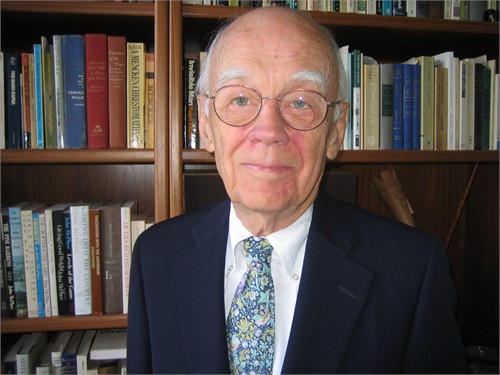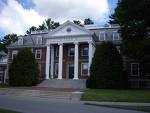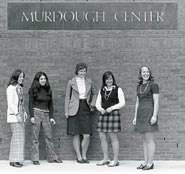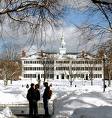John W. Hennessey, Jr.
March 25, 1925 - January 11, 2018
Professor John W. Hennessey Jr, age 92, of Shelburne, VT, and formerly of Hanover, NH, died of natural causes on January 11, 2018 at the Wake Robin Continuing Care Retirement Community. Hennessey was a much beloved and respected professor and administrator. He had a great love of teaching and was a mentor and advisor to his students, colleagues and friends, many of whom have said, “He changed my life.”
John Hennessey was a scholar, a feminist, a democrat, and an ethicist, with an exceptional academic career. Despite his myriad commitments, he always made time for his family. He and his wife Jean took each of their three grandchildren on cross-country trips, which covered all fifty states. His family called him “Super,” an apt description of his special friendships with all children. More recently, he became the proud great-grandfather of five great-granddaughters.
Obituaries
Summary
 John W. Hennessey Jr. was Jones Professor of Management and Third Century Professor Emeritus at the Tuck School of Business, Dartmouth College, where he was Associate Dean and then Dean from 1962 to 1976. He co-founded Dartmouth’s Ethics Institute in 1981 and taught business ethics to undergraduates as well as MBA students until his 1987 retirement. Then, he served for three years as the first Provost of the University of Vermont and (in 1990) its Interim President. He has served on more than thirty corporate and nonprofit governing boards, many times as chair. Notably, he served twice as chair of the Educational Testing Service and twice as chair of the Dartmouth-Hitchcock Medical Center. He (2010) sat on the boards of Americans for Campaign Reform and Patient Choices-Vermont, as well as several committees of Kendal at Hanover, a continuing care retirement community of which he was board chair in 1998-2001. Hennessey's first wife, Jean Marie Lande, an international environmental commissioner and a leading New Hampshire Democratic strategist, died in 2004, leaving their two children and three grandchildren. In 2006, Hennessey married Madeleine May Kunin, former Governor of Vermont and Deputy Secretary of Education and Ambassador to Switzerland during the Clinton administration; and now (2016) the couple lives in Wake Robin a continuing care retirement community in Shelburne, Vermont.
John W. Hennessey Jr. was Jones Professor of Management and Third Century Professor Emeritus at the Tuck School of Business, Dartmouth College, where he was Associate Dean and then Dean from 1962 to 1976. He co-founded Dartmouth’s Ethics Institute in 1981 and taught business ethics to undergraduates as well as MBA students until his 1987 retirement. Then, he served for three years as the first Provost of the University of Vermont and (in 1990) its Interim President. He has served on more than thirty corporate and nonprofit governing boards, many times as chair. Notably, he served twice as chair of the Educational Testing Service and twice as chair of the Dartmouth-Hitchcock Medical Center. He (2010) sat on the boards of Americans for Campaign Reform and Patient Choices-Vermont, as well as several committees of Kendal at Hanover, a continuing care retirement community of which he was board chair in 1998-2001. Hennessey's first wife, Jean Marie Lande, an international environmental commissioner and a leading New Hampshire Democratic strategist, died in 2004, leaving their two children and three grandchildren. In 2006, Hennessey married Madeleine May Kunin, former Governor of Vermont and Deputy Secretary of Education and Ambassador to Switzerland during the Clinton administration; and now (2016) the couple lives in Wake Robin a continuing care retirement community in Shelburne, Vermont.
Early years: education, military service, and college.
Hennessey was born in Danville, Pennsylvania on March 25, 1925. His parents were Martha Scott Braun, a Pittsburgh native who graduated from Vassar College in 1918 and led an active life of community service, and John W. Hennessey, a Buffalo native and a self-made engineer and industrialist. The family moved to York, Pennsylvania in 1929, where Hennessey attended public schools and then entered Princeton University in 1941. He volunteered for army service in 1943 and served in the Ordnance Department, rising from private to first lieutenant. His final year and a half of service was in the Philippine Islands. He returned to the USA in September 1946 and reentered Princeton the next January. In June 1948, he received his A.B. degree in economics and social institutions, magna cum laude, with election to Phi Beta Kappa.
The family moved to York, Pennsylvania in 1929, where Hennessey attended public schools and then entered Princeton University in 1941. He volunteered for army service in 1943 and served in the Ordnance Department, rising from private to first lieutenant. His final year and a half of service was in the Philippine Islands. He returned to the USA in September 1946 and reentered Princeton the next January. In June 1948, he received his A.B. degree in economics and social institutions, magna cum laude, with election to Phi Beta Kappa.
Marriage, graduate school, early teaching, Ph.D., and children.
Hennessey married Jean Marie Lande, Vassar ‘48, in June 1948 in Poughkeepsie, New York, and the couple settled in Cambridge, Massachusetts, where Hennessey entered the Harvard Graduate School of Business Administration and Jean taught school. He received his MBA, with distinction, in June 1950, and the couple moved to Seattle, Washington, where Hennessey began his teaching career as Instructor of Human Relations in the College of Business Administration of the University of Washington. He earned his Ph.D. and achieved tenure as an Associate Professor. Jean taught school, and the couple had two children: John 3d in September 1952 and Martha Scott in February1954. In September 1957, Hennessey accepted the invitation of the Amos Tuck School of Business Administration, Dartmouth College, to be Professor of Organizational Behavior, and the family moved to Hanover, New Hampshire.
The Dartmouth years.
Hennessey developed and taught the required courses in Administration (the human aspects of management and organizational behavior) and participated in wider Dartmouth affairs, (e.g., as chair of the trustees' planning committee on counseling and mental health in the 1962-66 period.) He became Tuck's Associate Dean in 1962, responsible for the MBA Program, faculty recruitment and development, and the substantial expansion of the schools from which Tuck attracted its applicants. During that time he wrote case studies in his field as well as a prize-winning article, and he co-authored books in hospital administration and in human relations.
In 1959, he was Professor in the IMEDE (later, IMD) graduate management program in Lausanne, Switzerland, co-sponsored by Harvard and the University of Lausanne. Later, he was an advisor for similar programs in Turkey, the USSR, and the People's Republic of China.

In November 1967, Dartmouth President John Sloan Dickey invited Hennessey to be Tuck’s sixth Dean, a post he accepted on the condition that the Trustees approve the admission of women to Tuck. (The undergraduate College was still all-male and would not become coeducational until 1971.) With the Trustees’ endorsement, Hennessey began his deanship in July 1968. The first woman matriculated at Tuck in September 1968.
During his eight years as Tuck’s Dean, Hennessey continued the rebuilding of the faculty and the MBA Curriculum, inaugurated the Tuck Executive Program, the Honor Code, the Tuck Educational Loan Program, and the alumni magazine, Tuck Today. He strengthened relationships with other parts of Dartmouth,  presided over the construction of the Murdough Center, featuring new classrooms and the Feldberg Library, combining the collections of Tuck and the Thayer School of Engineering, initiated studies of the desirability of a PhD program at Tuck, regularized the lateral thread of international business, technology, and ethics in the curriculum, built the Buchanan dormitory, expanded the Tuck Associates Program and the reach of Tuck alumni clubs in various cities, established the first separate (from Dartmouth) Tuck Annual Giving, and expanded the recruitment of minority students. He also chaired Dartmouth’s Council on Budgets and Priorities and the Council on Honorary Degrees.
presided over the construction of the Murdough Center, featuring new classrooms and the Feldberg Library, combining the collections of Tuck and the Thayer School of Engineering, initiated studies of the desirability of a PhD program at Tuck, regularized the lateral thread of international business, technology, and ethics in the curriculum, built the Buchanan dormitory, expanded the Tuck Associates Program and the reach of Tuck alumni clubs in various cities, established the first separate (from Dartmouth) Tuck Annual Giving, and expanded the recruitment of minority students. He also chaired Dartmouth’s Council on Budgets and Priorities and the Council on Honorary Degrees.
He served on the governing board of the American Assembly of Collegiate Schools of Business (AACSB) for eight years and was its President in 1975-1976. He was the founding chair of the Council on Opportunity in Graduate Management Education (COGME), established with a large grant from the Alfred P. Sloan Foundation to increase the flow of minority students to the five most selective MBA Programs. He also chaired the Executive Committee of the Graduate Management Admission Test, based in the Educational Testing Service and later became a trustee of ETS and twice its board chair. From 1977 to 1980, he served on the Organization and Governance Project of the Association of Academic Health Centers. In 1981, he received an honorary Doctor of Humane Letters degree from the University of New Hampshire.
Hennessey led the celebrations of Tuck’s 75th anniversary in 1975-76. In June 1976, he retired from the deanship and was chosen the first occupant of the Charles Henry Jones Professorship in Management and was simultaneously awarded by the trustees one of five Dartmouth Third Century chairs, established at Dartmouth’s bicentennial and focused especially on innovation in teaching and interdisciplinary links. In that post, Hennessey inaugurated courses in Conflict Resolution (with the chair of Sociology), in the undergraduate Policy Studies program as well as an elective in Dilemmas of Management in the Tuck second MBA year. The latter course evolved into courses in Business Ethics, co-taught with colleagues in Dartmouth’s Philosophy and Religion departments, coincident with the establishment of the Dartmouth Institute for Applied and Professional Ethics, of which Hennessey was a co-founder. He wrote and taught ethics cases at Tuck and Dartmouth and in other institutions, and he offered (with Philosophy and Religion colleagues) a number of alumni seminars in applied ethics for Dartmouth alumni in major cities.
He served for twelve years on the Board of Visitors of the Graduate School of Business, University of Pittsburgh. He was a director of the Encyclopaedia Britannica Educational Corporation from 1986 to 1993. In 1993, he joined the Governing Board of the Benton Center for the Improvement of Teaching and Learning of the University of Chicago. From 1994 to 2000, he was Chairman of the Review Panel of the DeWitt Wallace-Reader's Digest Incentive Awards in Teacher Education.
He served for several years on the Board of Overseers of Dartmouth’s Rockefeller Center for the Social Sciences. From 1992 to 1995, he was on the Board of Visitors of the Tucker Foundation at Dartmouth.
Hennessey was elected a trustee of Mary Hitchcock Memorial Hospital (MHMH) in 1963 and became the hospital’s board chair in 1977, following his commissioned study of the development of the Dartmouth-Hitchcock Medical Center (DHMC), a partnership among MHMH, the Dartmouth Medical School, the Hitchcock Clinic, and the Veterans’ Administration Medical Center in White River Junction, Vermont. He served as chair of the MHMH board and the board of DHMC during years of reinventing DHMC and planning its physical expansion and modernization (which led to DHMC’s 1991 move from Hanover to a new campus in Lebanon, NH) [In 1992-1995, Hennessey returned to the DHMC board and chaired it for those years.]
In that era, Hennessey served not only on the nonprofit boards of AACSB, COGME, ETS, and DHMC, he was also a trustee of the Milbank Memorial Fund, the University of Vermont, and he was a director of H.P. Hood, Inc., Zayre Corp., and Connecticut Mutual Life Insurance Company (where he served for 25 years and chaired the governance committee and the CML Foundation).
The UVM Years.

In June 1987, when Hennessey became emeritus at Dartmouth, he accepted the invitation of President Lattie Coor and the Board of Trustees of the University of Vermont (UVM) to become the institution’s first Provost, combining the Academic Vice President role with responsibility for the UVM budget. He served in that post until President Coor left to become President of Arizona Sate University in December 1989, when Hennessey was elected Interim President of UVM, a position he held until July 1990, when his successor took office. Under Coor’s leadership, UVM had enhanced its reputation for educational quality (was named as one of six “Public Ivies"), enhanced the physical plant, and celebrated its first institution-wide capital campaign. Hennessey’s responsibilities ranged across the University’s ten schools and colleges, as well as the libraries, computer center, Fleming Museum, and other supporting programs, and he served during a time of special focus on educational enrichment, expansion of research and technology, interdisciplinary innovation, and the enrichment of programs in cultural diversity and in state relationships. In his time as Interim President, he worked with Burlington Mayor Peter Clavelle to achieve new agreements in town-gown relations, including understandings about mutual interests in programs of research and innovation in a number of areas, the news of which was featured in The Chronicle of Higher Education.
Back at Dartmouth.

In July 1990, Hennessey returned to Hanover, NH, where he taught in the Institute for Lifelong Education at Dartmouth (ILEAD) and immersed himself in nonprofit governance, not only at DHMC, mentioned earlier, but also in the development of a continuing care retirement community, Kendal at Hanover. KaH was founded by Quakers, in association with the Kendal Corporation in Kennett Square, Pennsylvania, and established as a separate corporation in 1994, when Hennessey began his service a s director. He became vice chair in 1996 and chair in 1998. He also served for four years as a director of the Kendal Corporation. In the spring of 1991, Hennessey and his wife, Jean, moved into a Kendal apartment, and he retired from the board and served on a number of Kendal resident committees and councils.
s director. He became vice chair in 1996 and chair in 1998. He also served for four years as a director of the Kendal Corporation. In the spring of 1991, Hennessey and his wife, Jean, moved into a Kendal apartment, and he retired from the board and served on a number of Kendal resident committees and councils.
Governor John Lynch proclaimed March 25, 2005, Hennessey’s 80th birthday, “John W. Hennessey Jr. Day in New Hampshire.” He was a member of the Advisory Board of the Allwin Imitative for Corporate Citizenship at the Tuck School from 2002 to 2008. He joined the Board of Trustees of Vermont Law School in 1999, became emeritus in 2007, and received an honorary Doctor of Laws (LL.D.) degree at VLS’s 2008 commencement, at which Madeleine Kunin was the principal speaker and fellow recipient of an LL.D. degree. He was a director of the NH Community Loan Fund from 2000 to 2006 and served on its Audit Committee until 2013. He has been a director of Americans for Campaign Reform since 2003 and Patient Choices at End of Life-Vermont since 2006, and he joined the Board of Trustees of Goddard College in 2011. He was awarded an LL.D. degree, honoris causa, at the May 2012 Commencement of The University of Vermont.
Jean Hennessey died at Kendal in June 2004. Her memorial service in Dartmouth’s Rollins Chapel, celebrated her leadership in a rich variety of public service and philanthropic organizations, as well as her Dartmouth years as Research Fellow in Environmental Studies, Senior Fellow in the Institute of International Governance, and Director of the Institute on Canada and the United States. She was the first woman appointed by the President to the International Joint Commission, US-Canada, and she was the first American Director of the North American Commission for Environmental Cooperation, an offshoot of NAFTA and headquartered in Montréal.
The Hennesseys’ children are:
• John W. Hennessey 3rd, Investor Boston Harbor Angels and active Democrat. He is a retired management consultant and financial services manager who lives in Weston, Massachusetts.
• Martha Scott Hennessey, a N.H. State Senator and psychologist, who lives in Hanover, NH with her husband, Stephen Davis Severson, a retired teacher of mathematics and a soccer and ski coach. The couple has three children: Kristina Jean (KJ), an Ob/Gyn in practice in in CT, and married (2009) to Gregory Joseph Hill; Andrew Davis (Tucker), an entrepreneur in CT, and married to Sarah Persing, a plastic surgery resident at Yale; and Elizabeth Scott (Lizzy), , a law student at Boston University. She also has four granddaughters: Louisa Marie Hill (2012); Georgia Elizabeth Hill (2014); Beatrice Anna Hill (2016); and Sigrid Persing Severson (2016).
Marriage to Madeleine May Kunin

Hennessey married Madeleine May Kunin on February 12, 2006 , and the couple took up residence in Burlington and later Shelburne, Vermont. In addition to her past public positions, e.g. Governor of Vermont and Ambassador to Switzerland, Ms. Kunin is founder and director of the Institute for Sustainable Communities, Marsh Professor-at-large at The University of Vermont, a regular commentator on Vermont Public Radio, and a blogger on the Huffington Post. Her latest book, The New Feminist Agenda: Defining the Next Revolution for Women, Work, and Family was published in April 2012, and the couple has traveled across America for speeches and book signings. (See Ms. Kunin’s entry in Wikipedia for a full account of her career.) They moved in April 2014 to Wake Robin, a continuing care retirement community in Shelburne, Vermont.
Ms. Kunin’s children are:
• Julia M. Kunin, a sculptor, video artist, and teacher in New York City.
• Peter B. Kunin, a Burlington attorney who, with his wife, Lisa, has three children: William, David, and Sara.
• Adam W. Kunin, a cardiologist who, with his wife, Jane, has two sons: Samuel and Jacob.
• Daniel L. Kunin is an entreprenuer and international consultant, and was senior advisor to the President of the Republic of Georgia. Daniel and his partner Chantal Gauvin live in Montréal and Burlington. They have a new daughter Charlotte Madeleine Kunin.
Obituaries:
Wikipedia Entry for John W. Hennessey, Jr.
Revised January 31, 2018.
 John W. Hennessey Jr. was Jones Professor of Management and Third Century Professor Emeritus at the Tuck School of Business, Dartmouth College, where he was Associate Dean and then Dean from 1962 to 1976. He co-founded Dartmouth’s Ethics Institute in 1981 and taught business ethics to undergraduates as well as MBA students until his 1987 retirement. Then, he served for three years as the first Provost of the University of Vermont and (in 1990) its Interim President. He has served on more than thirty corporate and nonprofit governing boards, many times as chair. Notably, he served twice as chair of the Educational Testing Service and twice as chair of the Dartmouth-Hitchcock Medical Center. He (2010) sat on the boards of Americans for Campaign Reform and Patient Choices-Vermont, as well as several committees of Kendal at Hanover, a continuing care retirement community of which he was board chair in 1998-2001. Hennessey's first wife, Jean Marie Lande, an international environmental commissioner and a leading New Hampshire Democratic strategist, died in 2004, leaving their two children and three grandchildren. In 2006, Hennessey married Madeleine May Kunin, former Governor of Vermont and Deputy Secretary of Education and Ambassador to Switzerland during the Clinton administration; and now (2016) the couple lives in Wake Robin a continuing care retirement community in Shelburne, Vermont.
John W. Hennessey Jr. was Jones Professor of Management and Third Century Professor Emeritus at the Tuck School of Business, Dartmouth College, where he was Associate Dean and then Dean from 1962 to 1976. He co-founded Dartmouth’s Ethics Institute in 1981 and taught business ethics to undergraduates as well as MBA students until his 1987 retirement. Then, he served for three years as the first Provost of the University of Vermont and (in 1990) its Interim President. He has served on more than thirty corporate and nonprofit governing boards, many times as chair. Notably, he served twice as chair of the Educational Testing Service and twice as chair of the Dartmouth-Hitchcock Medical Center. He (2010) sat on the boards of Americans for Campaign Reform and Patient Choices-Vermont, as well as several committees of Kendal at Hanover, a continuing care retirement community of which he was board chair in 1998-2001. Hennessey's first wife, Jean Marie Lande, an international environmental commissioner and a leading New Hampshire Democratic strategist, died in 2004, leaving their two children and three grandchildren. In 2006, Hennessey married Madeleine May Kunin, former Governor of Vermont and Deputy Secretary of Education and Ambassador to Switzerland during the Clinton administration; and now (2016) the couple lives in Wake Robin a continuing care retirement community in Shelburne, Vermont.  The family moved to York, Pennsylvania in 1929, where Hennessey attended public schools and then entered Princeton University in 1941. He volunteered for army service in 1943 and served in the Ordnance Department, rising from private to first lieutenant. His final year and a half of service was in the Philippine Islands. He returned to the USA in September 1946 and reentered Princeton the next January. In June 1948, he received his A.B. degree in economics and social institutions, magna cum laude, with election to Phi Beta Kappa.
The family moved to York, Pennsylvania in 1929, where Hennessey attended public schools and then entered Princeton University in 1941. He volunteered for army service in 1943 and served in the Ordnance Department, rising from private to first lieutenant. His final year and a half of service was in the Philippine Islands. He returned to the USA in September 1946 and reentered Princeton the next January. In June 1948, he received his A.B. degree in economics and social institutions, magna cum laude, with election to Phi Beta Kappa.

 presided over the construction of the Murdough Center, featuring new classrooms and the
presided over the construction of the Murdough Center, featuring new classrooms and the 

 s director. He became vice chair in 1996 and chair in 1998. He also served for four years as a director of the Kendal Corporation. In the spring of 1991, Hennessey and his wife, Jean, moved into a Kendal apartment, and he retired from the board and served on a number of Kendal resident committees and councils.
s director. He became vice chair in 1996 and chair in 1998. He also served for four years as a director of the Kendal Corporation. In the spring of 1991, Hennessey and his wife, Jean, moved into a Kendal apartment, and he retired from the board and served on a number of Kendal resident committees and councils. 